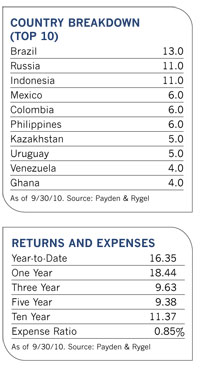Brazil, however, she considers an area of opportunity, and the country represents 13% of the portfolio. Although its bonds are at the lower end of the investment-grade spectrum, Brazil will likely experience economic growth of about 7% this year. Ceva was impressed by the country's economic resilience during the 2008 credit crisis, and notes that its debt has been decreasing in relation to GDP over the last several years.
Indonesia, which she calls "the second 'I' in BRIC," represents the fund's second largest country weighting at 11% of assets. The country has a population of 250 million people and strong growth in domestic demand for products. The total sovereign debt is a modest 34% of GDP, and its government has demonstrated prudent economic policy management. Ceva believes the government bonds could move into investment-grade territory over the next year. Such a credit upgrade would open up a new range of investors such as pension funds.
Bonds issued in Russia also look attractive, and are less expensive than other investment-grade sovereigns, in part because of the fallout from the European debt crisis. However, the country has an extraordinarily low level of debt given its economic growth rate, and stands to benefit from higher oil prices.

After pinning down country allocations, Ceva looks for the best ways to pick up yield in each country. About 20% of the fund is invested in local currency government and corporate bonds, which offer higher yields than dollar-denominated bonds from the same countries.
Although government bonds make up the bulk of fund assets, the portfolio also has a significant allocation to the bonds of private companies and quasi-private companies with some government ownership. Since demand for government bonds has led to higher prices and lower yields, emerging market corporates have offered investors a different pathway to higher yields.
Ceva avoids distressed debt. She focuses instead on better quality companies that operate in countries she likes and that boast ample free cash flow, low debt, experienced management and sufficient access to capital markets. Her preferred companies must also offer an attractive yield pickup over government bonds to justify the added risk of investing in them.
One holding that fits her criteria, Brazilian metals and mining company Vale S.A., yields about 200 basis points more than comparable U.S. Treasury securities and about 50 basis points more than Brazilian sovereign debt. Another Brazilian corporate holding, JBS, is the largest beef and chicken producer in the world. Its bonds yield about 8%. Another debt holding, the diversified India mining company Vedanta Resources, also yields about 8%.








